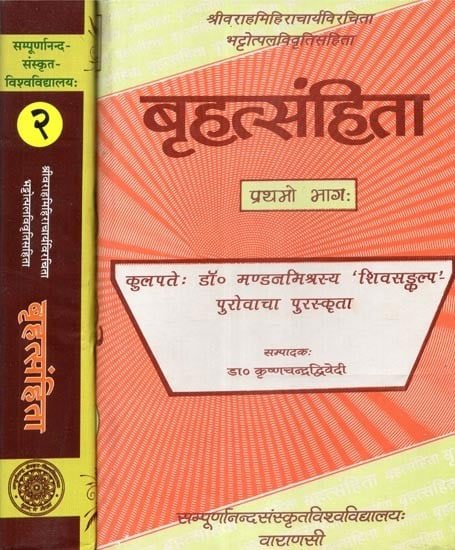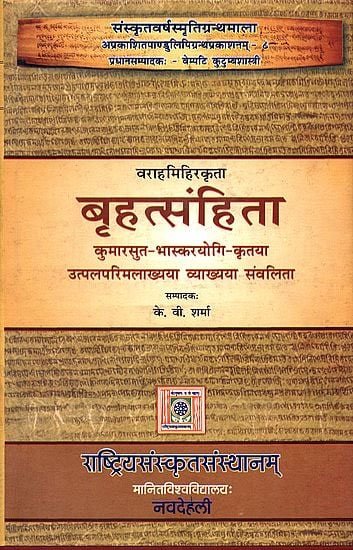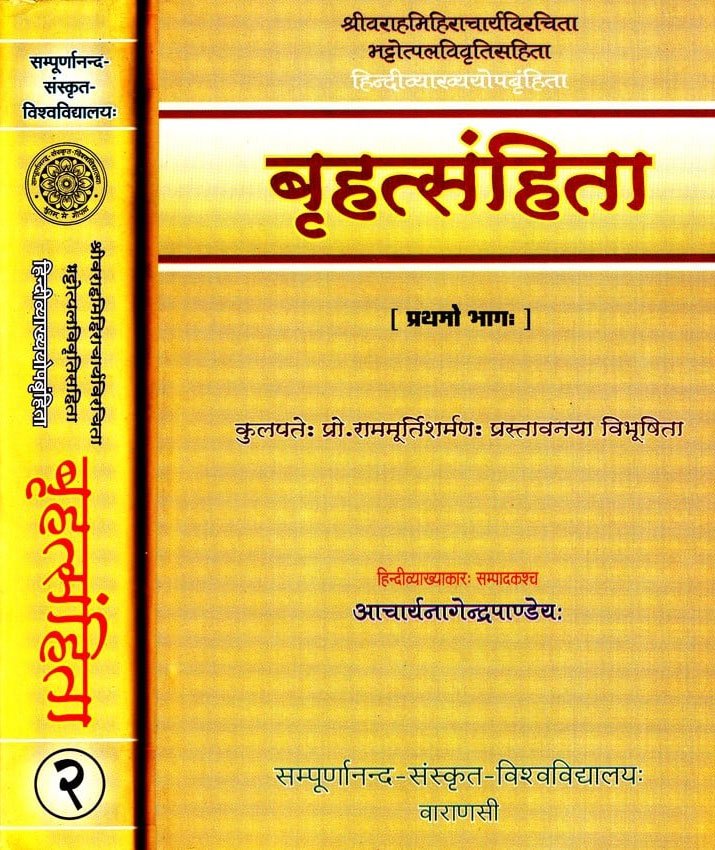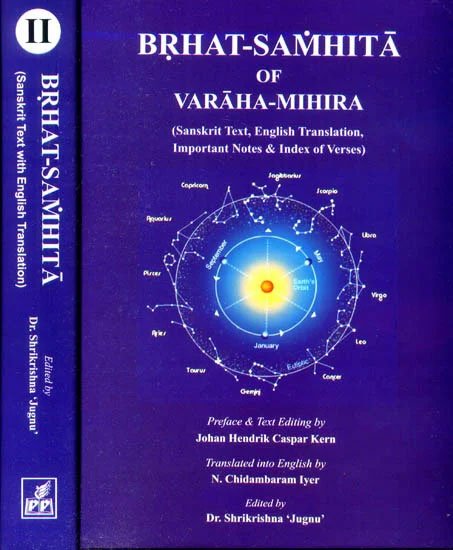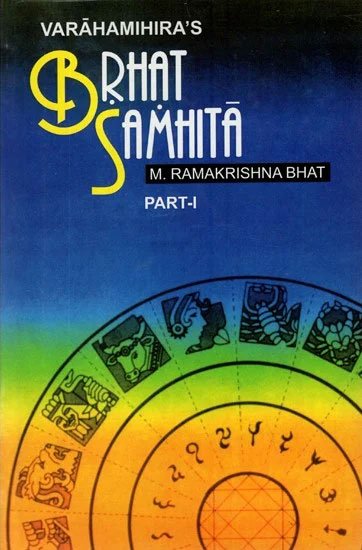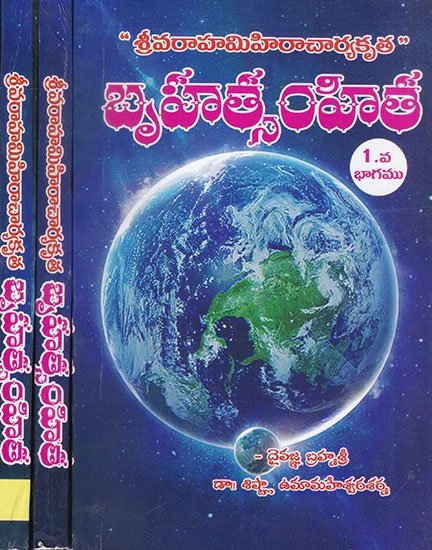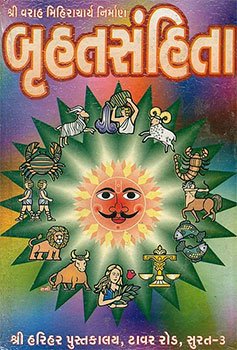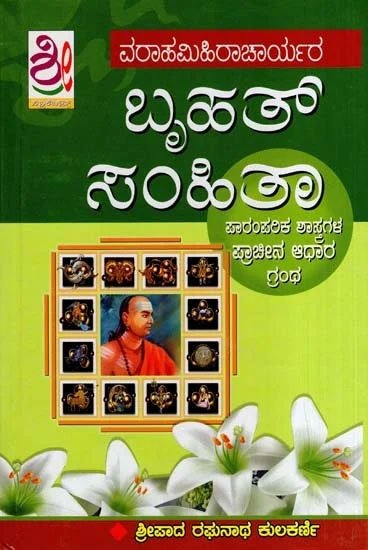Brihat-samhita [sanskrit]
26,560 words
The Sanskrit text of the Brihat-samhita from the 6th-century authored by Varaha Mihira in present-day Ujjain, India. It primarily deals with astrology and astronomy but is presented as an encyclopedia of knowledge.
Verse 68.10
मालव्यो नागनासः समभुजयुगलो जानुसम्प्राप्तहस्तो मांसैः पूर्णाङ्गसन्धिः समरुचिरतनुर्मध्यभागे कृशश्च ।
पञ्चाष्टौ चोर्ध्वमास्यं श्रुतिविवरमपि त्र्यङ्गुलोनं च तिर्यग्दीप्ताक्षं सत्कपोलं समसितदशनं नातिमांसाधरोष्ठम् ॥ १० ॥
[नागनाससमभुज]
mālavyo nāganāsaḥ samabhujayugalo jānusamprāptahasto māṃsaiḥ pūrṇāṅgasandhiḥ samaruciratanurmadhyabhāge kṛśaśca |
pañcāṣṭau cordhvamāsyaṃ śrutivivaramapi tryaṅgulonaṃ ca tiryagdīptākṣaṃ satkapolaṃ samasitadaśanaṃ nātimāṃsādharoṣṭham || 10 ||
[nāganāsasamabhuja]
The Sanskrit text of Verse 68.10 is contained in the book Brihata Samhita (Sanskrit Text with Hindi Translation) by Pandit Achyutananda Jha. This book is available online or you could buy the latest edition:
Read online Buy now! The Sanskrit text by Pandit Achyutananda Jha (2001)
Glossary of Sanskrit terms
Note: This extracts Sanskrit terms and links to English definitions from the glossary, based on an experimental segmentation of verse (68.10). Some terms could be superfluous while some might not be mentioned. Click on the word to show English definitions.
Malavi, Malavya, Naga, Nri, Sama, Bhuja, Janu, Samprapta, Hasta, Mamsa, Purna, Angasandhi, Rucira, Tanu, Tanus, Madhyabhaga, Krisha, Panca, Urdhvam, Urdhva, Asya, Shrutivivara, Api, Tryangula, Una, Tiryak, Diptaksha, Satka, Pola, Tada, Shana, Nati, Sadha, Tha,
Analysis of Sanskrit grammar
Note: this is an experimental feature and only shows the first possible analysis of the Sanskrit text (Verse 68.10). If the system was successful in segmenting the sentence, you will see of which words it is made up of, generally consisting of Nouns, Pronouns, Verbs, Participles and Indeclinables. Click on the link to show all possible derivations of the word.
- Line 1: “mālavyo nāganāsaḥ samabhujayugalo jānusamprāptahasto māṃsaiḥ pūrṇāṅgasandhiḥ samaruciratanurmadhyabhāge kṛśaśca ”
- mālavyo* -
-
mālavī (noun, feminine)[nominative plural], [vocative plural]mālavya (noun, masculine)[nominative single]
- nāga -
-
nāga (noun, masculine)[compound], [vocative single]nāga (noun, neuter)[compound], [vocative single]
- nā -
-
na (indeclinable particle)[indeclinable particle]na (noun, masculine)[compound], [vocative single]na (noun, neuter)[compound], [vocative single]nā (noun, feminine)[nominative single]nṛ (noun, masculine)[nominative single]
- asaḥ -
-
√sas (verb class 2)[imperfect active second single]
- sama -
-
sama (noun, masculine)[compound], [vocative single]sama (noun, neuter)[compound], [vocative single]√sam (verb class 1)[imperative active second single]
- bhuja -
-
bhuja (noun, masculine)[compound], [vocative single]√bhuj (verb class 6)[imperative active second single]
- yugalo -
-
- jānu -
-
jānu (noun, neuter)[compound], [adverb], [nominative single], [vocative single], [accusative single]
- samprāpta -
-
samprāpta (noun, masculine)[compound], [vocative single]samprāpta (noun, neuter)[compound], [vocative single]
- hasto* -
-
hasta (noun, masculine)[nominative single]
- māṃsaiḥ -
-
māṃsa (noun, masculine)[instrumental plural]māṃsa (noun, neuter)[instrumental plural]
- pūrṇā -
-
pūrṇa (noun, masculine)[compound], [vocative single]pūrṇa (noun, neuter)[compound], [vocative single]pūrṇā (noun, feminine)[nominative single]√pṝ -> pūrṇa (participle, masculine)[vocative single from √pṝ class 3 verb], [vocative single from √pṝ class 6 verb], [vocative single from √pṝ class 9 verb]√pṝ -> pūrṇa (participle, neuter)[vocative single from √pṝ class 3 verb], [vocative single from √pṝ class 6 verb], [vocative single from √pṝ class 9 verb]√pṝ -> pūrṇā (participle, feminine)[nominative single from √pṝ class 3 verb], [nominative single from √pṝ class 6 verb], [nominative single from √pṝ class 9 verb]
- aṅgasandhiḥ -
-
aṅgasandhi (noun, masculine)[nominative single]aṅgasandhi (noun, feminine)[nominative single]
- sama -
-
sama (noun, masculine)[compound], [vocative single]sama (noun, neuter)[compound], [vocative single]√sam (verb class 1)[imperative active second single]
- rucira -
-
rucira (noun, masculine)[compound], [vocative single]rucira (noun, neuter)[compound], [vocative single]
- tanur -
-
tanus (noun, feminine)[compound], [adverb], [nominative single], [vocative single]tanus (noun, neuter)[compound], [adverb], [nominative single], [vocative single], [accusative single]tanu (noun, masculine)[nominative single]
- madhyabhāge -
-
madhyabhāga (noun, masculine)[locative single]
- kṛśaś -
-
kṛśa (noun, masculine)[nominative single]
- ca -
-
ca (indeclinable conjunction)[indeclinable conjunction]ca (noun, masculine)[compound], [vocative single]ca (noun, neuter)[compound], [vocative single]
- Line 2: “pañcāṣṭau cordhvamāsyaṃ śrutivivaramapi tryaṅgulonaṃ ca tiryagdīptākṣaṃ satkapolaṃ samasitadaśanaṃ nātimāṃsādharoṣṭham || 10 |”
- pañcāṣ -
-
pañca (noun, masculine)[nominative plural], [vocative plural]pañcā (noun, feminine)[nominative plural], [vocative plural], [accusative plural]
- ṭau -
-
ṭa (noun, masculine)[nominative dual], [vocative dual], [accusative dual]ṭu (noun, masculine)[locative single]
- co -
-
ca (indeclinable conjunction)[indeclinable conjunction]ca (noun, masculine)[compound], [vocative single]ca (noun, neuter)[compound], [vocative single]cā (noun, feminine)[nominative single]
- ūrdhvam -
-
ūrdhvam (indeclinable)[indeclinable]ūrdhva (noun, masculine)[adverb], [accusative single]ūrdhva (noun, neuter)[adverb], [nominative single], [accusative single]ūrdhvā (noun, feminine)[adverb]
- āsyam -
-
āsya (noun, masculine)[adverb], [accusative single]āsya (noun, neuter)[adverb], [nominative single], [accusative single]āsyā (noun, feminine)[adverb]√ās -> āsya (participle, masculine)[adverb from √ās]√ās -> āsya (participle, neuter)[adverb from √ās]√ās -> āsyā (participle, feminine)[adverb from √ās]√as -> āsya (participle, masculine)[adverb from √as]√as -> āsya (participle, neuter)[adverb from √as]√as -> āsyā (participle, feminine)[adverb from √as]√ās -> āsya (participle, masculine)[accusative single from √ās]√ās -> āsya (participle, neuter)[nominative single from √ās], [accusative single from √ās]√as -> āsya (participle, masculine)[accusative single from √as]√as -> āsya (participle, neuter)[nominative single from √as], [accusative single from √as]√as (verb class 4)[imperfect active first single]
- śrutivivaram -
-
śrutivivara (noun, neuter)[adverb], [nominative single], [accusative single]
- api -
-
api (indeclinable preposition)[indeclinable preposition]ap (noun, neuter)[locative single]
- tryaṅgulo -
-
tryaṅgula (noun, masculine)[compound], [vocative single]tryaṅgula (noun, neuter)[compound], [vocative single]tryaṅgulā (noun, feminine)[nominative single]
- ūnam -
-
ūna (noun, masculine)[adverb], [accusative single]ūna (noun, neuter)[adverb], [nominative single], [accusative single]ūnā (noun, feminine)[adverb]
- ca -
-
ca (indeclinable conjunction)[indeclinable conjunction]ca (noun, masculine)[compound], [vocative single]ca (noun, neuter)[compound], [vocative single]
- tiryag -
-
tiryak (indeclinable)[indeclinable]
- dīptākṣam -
-
dīptākṣa (noun, masculine)[adverb], [accusative single]dīptākṣa (noun, neuter)[adverb], [nominative single], [accusative single]
- satka -
-
satka (noun, masculine)[compound], [vocative single]satka (noun, neuter)[compound], [vocative single]
- polam -
-
pola (noun, masculine)[adverb], [accusative single]
- samasi -
-
√sam (verb class 1)[present active second single]
- tada -
-
tada (noun, masculine)[compound], [vocative single]tada (noun, neuter)[compound], [vocative single]
- śanam -
-
śana (noun, masculine)[adverb], [accusative single]śana (noun, neuter)[adverb], [nominative single], [accusative single]
- nātim -
-
nāti (noun, masculine)[accusative single]nāti (noun, feminine)[accusative single]
- āṃ -
-
ā (noun, feminine)[accusative single]o (noun, masculine)[accusative single]
- sādha -
-
sādha (noun, masculine)[compound], [vocative single]√sādh (verb class 1)[imperative active second single]
- roṣ -
-
ṛ (noun, feminine)[genitive dual], [locative dual]ṛ (noun, masculine)[genitive dual], [locative dual]ru (noun, masculine)[ablative single], [genitive single]
- ṭham -
-
ṭha (noun, masculine)[adverb], [accusative single]
- Cannot analyse 10
Other editions:
Also see the following editions of the Sanskrit text or (alternative) English translations of the Verse 68.10
Brhatsamhita with the Commentary of Bhattotpala
by Krishna Chandra Dwivedi (2016)
Publisher: Sampurnanand Sanskrit University; 1229 pages;
Buy now!
Brihat Samhita with the Commentary of Utpalapatimala of Yogisvara
by K. V. Sharma (2012)
Publisher: Rashtriya Sanskrit Sansthan, Janakpuri; 754 pages; ISBN-10; 8186111360; ISBN-13: 9788186111369
Buy now!
Brihat Samhita (Hindi Translation)
by K. V. Sharma (2002)
Publisher: Sampurnanand Sanskrit University; 2359 pages; ISBN-13: 9789387890008.
Buy now!
Brhat Samhita (English translation)
by N. Chidambaram Iyer (2022)
Publisher: Parimal Publication Pvt. Ltd.; 801 pages; Edited by Dr. Shrikrishna Jugnu; ISBN-10: 8171104215; ISBN-13: 9788171104215.
Buy now!
Brhat Samhita (English with notes)
by M. Ramakrishna Bhat (2010)
Publisher: Motilal Banarsidas Publishers Pvt. Ltd.; 1155 pages; ISBN-10: 8120810600; ISBN-13: 9788120810600.
Buy now!
Brhat Samhita (Telugu translation)
by Sishtla Umamaheswara Sharma (2020)
Publisher: Mohan Publications, Andhra Pradesh; 846 pages.
Buy now!Preview of verse 68.10 in Kannada sript:
ಮಾಲವ್ಯೋ ನಾಗನಾಸಃ ಸಮಭುಜಯುಗಲೋ ಜಾನುಸಮ್ಪ್ರಾಪ್ತಹಸ್ತೋ ಮಾಂಸೈಃ ಪೂರ್ಣಾಙ್ಗಸನ್ಧಿಃ ಸಮರುಚಿರತನುರ್ಮಧ್ಯಭಾಗೇ ಕೃಶಶ್ಚ ।
ಪಞ್ಚಾಷ್ಟೌ ಚೋರ್ಧ್ವಮಾಸ್ಯಂ ಶ್ರುತಿವಿವರಮಪಿ ತ್ರ್ಯಙ್ಗುಲೋನಂ ಚ ತಿರ್ಯಗ್ದೀಪ್ತಾಕ್ಷಂ ಸತ್ಕಪೋಲಂ ಸಮಸಿತದಶನಂ ನಾತಿಮಾಂಸಾಧರೋಷ್ಠಮ್ ॥ ೧೦ ॥
[ನಾಗನಾಸಸಮಭುಜ]
Brhat Samhita (Gujarati translation)
by - (2000)
Publisher: Shree Harihar Pustakalay, Surat; Author: Shri Varahamihira Acharya (શ્રી વરાહમિહીરાચાર્ય); 432 pages.
Buy now!Preview of verse 68.10 in Gujarati sript:
માલવ્યો નાગનાસઃ સમભુજયુગલો જાનુસમ્પ્રાપ્તહસ્તો માંસૈઃ પૂર્ણાઙ્ગસન્ધિઃ સમરુચિરતનુર્મધ્યભાગે કૃશશ્ચ ।
પઞ્ચાષ્ટૌ ચોર્ધ્વમાસ્યં શ્રુતિવિવરમપિ ત્ર્યઙ્ગુલોનં ચ તિર્યગ્દીપ્તાક્ષં સત્કપોલં સમસિતદશનં નાતિમાંસાધરોષ્ઠમ્ ॥ ૧૦ ॥
[નાગનાસસમભુજ]
Brhat Samhita (Kannada translation)
by Sripada Raghunatha Kulkarni (2021)
Publisher: Srinidhi Publications, Bangalore; 668 pages with illustrations.
Buy now!Preview of verse 68.10 in Kannada sript:
ಮಾಲವ್ಯೋ ನಾಗನಾಸಃ ಸಮಭುಜಯುಗಲೋ ಜಾನುಸಮ್ಪ್ರಾಪ್ತಹಸ್ತೋ ಮಾಂಸೈಃ ಪೂರ್ಣಾಙ್ಗಸನ್ಧಿಃ ಸಮರುಚಿರತನುರ್ಮಧ್ಯಭಾಗೇ ಕೃಶಶ್ಚ ।
ಪಞ್ಚಾಷ್ಟೌ ಚೋರ್ಧ್ವಮಾಸ್ಯಂ ಶ್ರುತಿವಿವರಮಪಿ ತ್ರ್ಯಙ್ಗುಲೋನಂ ಚ ತಿರ್ಯಗ್ದೀಪ್ತಾಕ್ಷಂ ಸತ್ಕಪೋಲಂ ಸಮಸಿತದಶನಂ ನಾತಿಮಾಂಸಾಧರೋಷ್ಠಮ್ ॥ ೧೦ ॥
[ನಾಗನಾಸಸಮಭುಜ]
![Brihat-samhita [sanskrit] - book cover](/uploads/a/Brihat-Samhita-Sanskrit.jpg)
